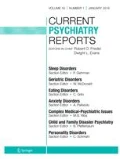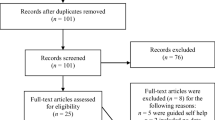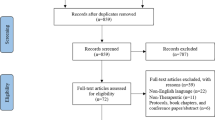Abstract
Over the last several years, there has been a substantial increase in the number of publications reporting on Internet interventions for mental health and addictions. This paper provides a summary of the recent research on Internet interventions for the most common mental health and addictions concerns—depression, anxiety, alcohol and smoking. There is considerable evidence for the effectiveness of Internet-based interventions targeting depression, anxiety disorders, alcohol use and smoking. Small to moderate effect sizes have been reported for interventions targeting depression, anxiety and alcohol use, and smoking interventions have shown large effects. The addition of human support to depression and anxiety interventions has generally resulted in larger treatments effects, but this trend has not been observed in trials of interventions targeting alcohol use. There is some evidence that online interventions can be as effective as face-to-face therapies, at least for anxiety disorders. Despite a proliferation of research activity in this area, gaps in knowledge remain. Future research should focus on the development and evaluation of interventions for different platforms (e.g. smartphone applications), examining the long-term impacts of these interventions, determining active intervention components and identifying methods for enhancing tailoring and engagement. Careful consideration should be given to the ongoing technical and clinical expertise required to ensure that Internet interventions are delivered safely and professionally in a rapidly changing technology environment.
Similar content being viewed by others
References
Papers of particular interest, published recently, have been highlighted as: • Of importance
Cunningham JA, Humphreys K, Koski-Jannes A. Providing personalized assessment feedback for problem drinking on the Internet: a pilot project. J Stud Alcohol. 2000;61(6):794–8.
Carlbring P, Westling BE, Ljungstrand P, Ekselius L, Andersson G. Treatment of panic disorder via the Internet: a randomized trial of a self-help program. Behav Ther. 2001;32(4):751–64.
Salem DA, Bogat GA, Reid C. Mutual help goes on-line. J Community Psychol. 1997;25(2):189–207.
Morris ZS, Wooding S, Grant J. The answer is 17 years, what is the question: understanding time lags in translational research. J Roy Soc Med. 2011;104(12):510–20.
Rogers EM. Diffusion of innovations. 5th ed. New York: The Free Press; 2003.
Ybarra ML, Suman M. Help seeking behavior and the Internet: a national survey. Int J Med Inform. 2006;75(1):29–41.
Baker L, Wagner TH, Singer S, Bundorf MK. Use of the Internet and e-mail for health care information—results from a national survey. Jama-J Am Med Assoc. 2003;289(18):2400–6.
Cohen RA, Adams PF. Use of the internet for health information: United States, 2009. NCHS data brief. 2011 Jul(66):1–8
Andersson G, Cuijpers P. Internet-based and other computerized psychological treatments for adult depression: A meta-analysis 2009;38(4):196–205
Andrews G, Cuijpers P, Craske M, McEvoy P, Titov N. Computer therapy for the anxiety and depressive disorders is effective, acceptable and practical health care: a meta-analysis. 2010;5(10):e13196
Arnberg FK, Linton SJ, Hultcrantz M, Heintz E, Jonsson U. Internet-delivered psychological treatments for mood and anxiety disorders: a systematic review of their efficacy, safety, and cost-effectiveness. PLoS One. 2014;9(5):e98118. Provides the most recent evidence for the efficacy of Internet-based interventions for depression, as well as information regarding non-inferiority to established treatments, safety and cost-effectiveness.
Cuijpers P, Marks I, van Straten A, Cavanagh K, Gega L, Andersson G. Computer-aided psychotherapy for anxiety disorders: a meta-analytic review. 2009 Jun;38(2):66–82
Spek V, Cuijpers P, Nyklicek I, Riper H, Keyzer J, Pop V. Internet-based cognitive behaviour therapy for symptoms of depression and anxiety: a meta-analysis. 2007a Mar;37(3):319–28
Griffiths K, Farrer L, Christensen H. The efficacy of internet interventions for depression and anxiety disorders: a review of randomised controlled trials. 2010 Jun 7;192(11 Suppl):S4-11
Hedman E, Ljotsson B, Lindefors N. Cognitive behavior therapy via the Internet: a systematic review of applications, clinical efficacy and cost-effectiveness. Expert review of pharmacoeconomics & outcomes research. 2012 Dec;12(6):745–64
Cuijpers P, Donker T, Johansson R, Mohr DC, van Straten A, Andersson G. Self-guided psychological treatment for depressive symptoms: a meta-analysis 2011;6(6):e21274
Newman MG, Szkodny LE, Llera SJ, Przeworski A. A review of technology-assisted self-help and minimal contact therapies for drug and alcohol abuse and smoking addiction: is human contact necessary for therapeutic efficacy? Clin Psychol Rev. 2011;31(1):178–86.
Titov N, Andrews G, Davies M, McIntyre K, Robinson E, Solley K. Internet treatment for depression: a randomized controlled trial comparing clinician vs. technician assistance. 2010;5(6):e10939.
Andersson G, Hesser H, Veilord A, Svedling L, Andersson F, Sleman O, et al. Randomised controlled non-inferiority trial with 3-year follow-up of internet-delivered versus face-to-face group cognitive behavioural therapy for depression. J Affect Disorders. 2013;151(3):986–94.
Johansson R, Ekbladh S, Hebert A, Lindstrom M, Moller S, Petitt E, et al. Psychodynamic guided self-help for adult depression through the internet: a randomised controlled trial. PLoS One. 2012;7(5):e38021.
Carlbring P, Hagglund M, Luthstrom A, Dahlin M, Kadowaki A, Vernmark K, et al. Internet-based behavioral activation and acceptance-based treatment for depression: a randomized controlled trial. J Affect Disorders. 2013;148(2–3):331–7.
Griffiths KM, Farrer L, Christensen H. The efficacy of internet interventions for depression and anxiety disorders: a review of randomised controlled trials. Med J Aust. 2010;192(11 Suppl):S4–S11.
Mewton L, Smith J, Rossouw P, Andrews G. Current perspectives on Internet-delivered cognitive behavioral therapy for adults with anxiety and related disorders. Psychol Res Behav Manag. 2014;7:37–46. In addition to efficacy data, Mewton et al.’s (2014) recent review provides a broad overview of internet-based cognitive behavioural therapy for a wide range of anxiety disorders, and provides comment on contemporary issues within the field.
Cuijpers P, Marks IM, van Straten A, Cavanagh K, Gega L, Andersson G. Computer-aided psychotherapy for anxiety disorders: a meta-analytic review. Cogn Behav Ther. 2009;38(2):66–82.
Christensen H, Griffiths KM, Farrer L. Adherence in internet interventions for anxiety and depression. J Med Internet Res. 2009;11(2):e13.
Reger MA, Gahm GA. A meta-analysis of the effects of internet- and computer-based cognitive-behavioral treatments for anxiety. J Clin Psychol. 2009;65(1):53–75.
Andrews G, Cuijpers P, Craske MG, McEvoy P, Titov N. Computer therapy for the anxiety and depressive disorders is effective, acceptable and practical health care: A meta-analysis. 2010;.5(10):ArtID e13196
Bewick BM, Trusler K, Barkham M, Hill AJ, Cahill J, Mulhern B. The effectiveness of web-based interventions designed to decrease alcohol consumption—a systematic review. Prev Med. 2008;47(1):17–26.
Tait RJ, Christensen H. Internet-based interventions for young people with problematic substance use: a systematic review. Med J Aust. 2010;192(11 Suppl):S15–21.
Khadjesari Z, Murray E, Hewitt C, Hartley S, Godfrey C. Can stand-alone computer-based interventions reduce alcohol consumption? A systematic review. Addiction. 2011;106(2):267–82.
White A, Kavanagh D, Stallman H, Klein B, Kay-Lambkin F, Proudfoot J, et al. Online alcohol interventions: a systematic review. J Med Internet Res. 2010;12(5):e62.
32.• Riper H, Blankers M, Hadiwijaya H, Cunningham JA, Clarke S, Ebert D, et al. Effectiveness of brief Internet-based interventions for adult problem drinkers: a meta-analysis. 2014;9(6):e99912. This article provides the most recent review of the efficacy of Internet interventions for hazardous drinking in the general population.
Kypri K, Vater T, Bowe SJ, Saunders JB, Cunningham JA, Horton NJ, et al. Web-based alcohol screening and brief intervention for university students: a randomized trial. JAMA. 2014;311(12):1218–24.
Civljak M. SLF, Hartmann-Boyce, J., Sheikh, A., Car, J. Internet-based interventions for smoking cessation. 2013 (7):Art. No.: CD007078.
McClure JB, Derry H, Riggs KR, Westbrook EW, St John J, Shortreed SM, et al. Questions about quitting (Q2): design and methods of a Multiphase Optimization Strategy (MOST) randomized screening experiment for an online, motivational smoking cessation intervention. Contemp Clin Trials. 2012;33(5):1094–102.
McClure JB, Shortreed SM, Bogart A, Derry H, Riggs K, St John J, et al. The effect of program design on engagement with an internet-based smoking intervention: randomized factorial trial. J Med Internet Res. 2013;15(3):e69.
McClure JB, Peterson D, Derry H, Riggs K, Saint-Johnson J, Nair V, et al. Exploring the "Active Ingredients" of an online smoking intervention: a randomized factorial trial. Nicotine Tob Res. 2014 Apr 11:Epub ahead of print 15/04/2014. Research by McClure et al. provides a model for investigating the “active ingredients” of an Internet intervention for smoking cessation in a randomised factorial trial. This will enable further research to conduct more refined investigations into the efficacy of Internet interventions in terms of their components rather than the intervention as a whole.
Elfeddali I, Bolman C, Candel MJ, Wiers RW, de Vries H. Preventing smoking relapse via Web-based computer-tailored feedback: a randomized controlled trial. J Med Internet Res. 2012;14(4):e109.
Cobb CO, Graham AL. Use of "Non-assigned" interventions in a randomized trial of internet and telephone treatment for smoking cessation. Nicotine Tob Res. 2014 May 8:Epub ahead of print 09/5/2014.
Ramo DE, Liu, H. & Prochaska, J. J. . A mixed-methods study of young adults’ receptivity to using Facebook for smoking cessation: if you build it, will they come? 2014:Epub ahead of print 27/02/2014.
Whittaker R, McRobbie, H., Bullen, C., Borland, R., Rodgers, A.,Gu, Y. Mobile phone-based interventions for smoking cessation. 2012 (11):Art. No.: CD006611.
Cropsey KL, Forray, A., Ikomi, J. T., Pergadia, M. L., Peters, E. N. & West, R. News Committee for the SRNT Treatment Network. 2014;6(3).
Bennett K, Bennett AJ, Griffiths KM. Security Considerations for E-Mental Health Interventions. Journal of medical Internet research. 2010;12(5).
Compliance With Ethics Guidelines
ᅟ
Conflict of Interest
John A Cunningham, Amelia Gulliver, Lou Farrer, Kylie Bennett and Bradley Carron-Arthur declare that they have no conflict of interest.
Human and Animal Rights and Informed Consent
This article does not contain any studies with human or animal subjects performed by any of the authors.
Author information
Authors and Affiliations
Corresponding author
Additional information
This article is part of the Topical Collection on Psychiatry in the Digital Age
Rights and permissions
About this article
Cite this article
Cunningham, J.A., Gulliver, A., Farrer, L. et al. Internet Interventions for Mental Health and Addictions: Current Findings and Future Directions. Curr Psychiatry Rep 16, 521 (2014). https://doi.org/10.1007/s11920-014-0521-5
Published:
DOI: https://doi.org/10.1007/s11920-014-0521-5




